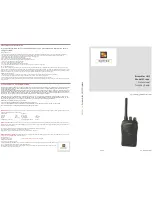
22
Copyright
©
2005 Nokia. All rights reserved
.
■
Transmission barring
When transmission barring is active, the radio does not send any signals to the
network and only limited network services are available. In network mode, the
radio can only receive group calls and status and text messages addressed to talk
groups, providing that the radio is registered to the network. In direct mode, the
radio can receive direct mode calls. Note that when transmission barring is active,
the radio cannot re-register to the network, for example, if it is switched off and
then on again.
Note:
The limited network services in network mode are only available in
the coverage area of the network cell where the radio was last registered.
The radio cannot register to other network cells while transmission
barring is active, and therefore the area of operation may be limited.
When transmission barring is active, in network mode the radio cannot send the
necessary information to the network about changes in talk groups. When
transmission barring is active, you cannot change the selected group. If you make
any other changes that affect talk groups, for example, change the selected folder,
home group or the scanning priority of a group, you will not be able to receive
further communication from the affected groups. After transmission barring has
been deactivated, the radio can attempt to negotiate the changes with the
network.
If you start to make a
red key call
or an emergency call to the emergency number
programmed into your radio when transmission barring is active, the radio will
automatically deactivate transmission barring and attempt to make the call. See
also
Red key calls and emergency calls in direct mode
on page
71
.
Summary of Contents for TMR880
Page 1: ...User Guide ...
















































